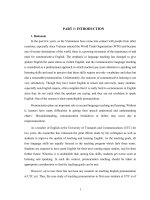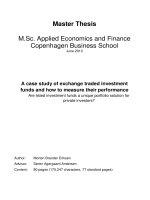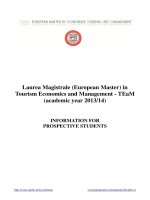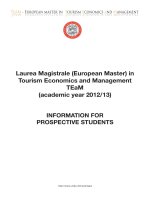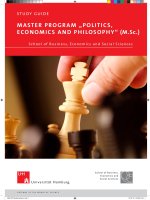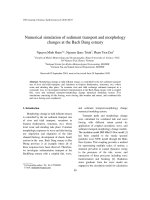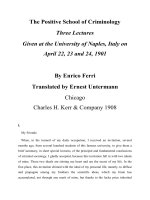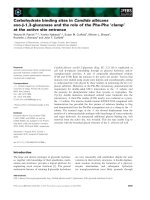Master Program Applied Economics at the Faculty of Economics and Statistics of the University of Innsbruck ppt
Bạn đang xem bản rút gọn của tài liệu. Xem và tải ngay bản đầy đủ của tài liệu tại đây (177.42 KB, 12 trang )
The English version of the curriculum for the “Master Program in Applied Economics” unfolds no
legal effects and is for information purposes only. The legal basis is regulated in the curriculum
published in the University of Innsbruck Bulletin on 4 May 2007, issue 52, No. 226. Decision of the
Curriculum Committee of the Faculty of Economics and Statistics on 05.03.2007, approved by Senate
Decree on 08.03.2007.
On the basis of § 25 paragraph 1 no. 10 University Act 2002, BGBl. I (Federal Law Gazette) No. 120,
most recently amended by Federal Law BGBl. I (Federal Law Gazette) No. 74/2006 and § 32 Section
"Regulations of Study Law", republished in the University of Innsbruck Bulletin of 3 February 2006,
Issue 16, No. 90, most recently amended by the University of Innsbruck Bulletin of 4 December 2006,
Issue 7, No. 36, the following is decreed:
Curriculum for the
Master Program Applied Economics
at the Faculty of Economics and Statistics of the University of Innsbruck
§ 1 Qualification profile
(1) The Master program Applied Economics aims at deepening and supplementing the scientific
education preparing students for careers in the economic sciences and builds on a subject-related
Bachelor program. In its core it consists of teaching scientific theories, methods and tools applied in
the economic sciences. It also incorporates the findings of gender research. The Master program
Applied Economics is listed among the programs in social and economic sciences.
(2) The Master program is research-based. It widens and deepens the students’ specialist knowledge,
qualifies them for scientific research thereby laying the foundations for an advancement of the field.
It qualifies the students for leading positions by imparting faculties such autonomy, discrimination
and decision-making.
(3) Apart from broadening the students’ specialist knowledge the Master program also aims at a
deepening and specialization in the area of the faculty’s research areas. In the final Master thesis the
students are to apply the newly acquired theories and methods to topical subject-related issues.
(4) The Master program Applied Economics seeks to prepare students for leading, planning, analyzing
and counseling occupations in corporations and industries of varying size, including free-lance jobs,
as well as for employment in the civil service, organizations, chambers, special interest groups and
the media, and also for jobs in teaching and/or research institutions as well as in non-profit and
international organizations.
(5) Graduates of the Master program Applied Economics
- are well-grounded in the field of economics which will enable them to tackle new tasks
quickly and self-reliantly,
- are able to apply their acquired knowledge and expertise in a professional way towards the
solution of problems in their field,
- are able to successfully apply the acquired methods in their research as well as to test them
critically and develop them further,
- have acquired specialist and social competences which prepare them well for leading
positions
§ 2 Length and scope
(1) The Master program Applied Economics comprises 120 ECTS-credit points which equals 4
semesters.
(2) The program is divided up into modules.
§ 3 Admission
(1) Admission to the Master program Applied Economics requires the completion of a subject-
based Bachelor program at a university or college or equivalent studies at accredited
domestic or foreign post secondary educational institutions.
(2) This precondition is fulfilled with the completion of the Bachelor program Management and
Economics at the University of Innsbruck.
§ 4 Modules
(1) A module constitutes a thematic unit and usually comprises courses equivalent to four
semester hours
(= 60 teaching units of 45 minutes each) and ten ECTS credit points.
(2) All modules consist of two courses one of which being a course with continuous performance
assessment, except for
1. The mandatory module referred to in § 7 (1).
2. The elective module referred to in § 7 (2/14) which is provided by a different Master
program and has to be completed according to the regulations of the respective
curriculum.
(3) The curriculum consists of mandatory and elective modules.
§ 5 Types of courses and maximum numbers of students per course
(1) Lectures are scientific talks which introduce students to the subject or provide explanations
and discussions of research issues along with methodical approaches and present current
research results. The maximum number of participants amounts to 140.
(2) Courses with continuous performance assessment are:
1. Proseminars (PS): Proseminars impart the basics of scientific research, introduce students
to the economics literature and current level of knowledge in the field and deal with
issues of the subject in an exemplary way.
2. Seminars (SE): Seminars aim at deepening the scientific discourse. Participants are
expected to deliver written and/or oral contributions of their own. The maximum
number of participants is 20.
§ 6 Procedure for the allotment of places in courses with a limited number of participants
In courses with a limited number of participants course places are allotted as follows:
1. Every student enrolled in the program is allotted a quota of twice 1000 points at the
beginning of the registration period of the respective semester. This quota expires at the end
of the registration period.
2. Every student uses an optional number of points of her/his first quota of 1000 points for the
desired course thus expressing her/his preference for the first allotment round of the course
places.
3. Every student uses an optional number of points of her/his second quota of 1000 points for
the desired course thus expressing her/his preference for the second allotment round of the
course places.
4. Every student is allotted up to three course places in modules. The allotment of a course
place in a particular module depends on the number of points taken from the first quota for
each course. It is important that the students check the requirements for admission to a
course beforehand.
5. Every student is allotted course places in modules according to the number of points taken
from the second quota of points providing she or he fulfills the requirements for admission
to the courses. These are course places which have not been allotted previously (cf. 2 to 4).
6. The number of course places which have been allotted according to the procedure described
in 1 to 5 must not exceed the number of course places needed to acquire the 30 ECTS-credit
points per semester as prescribed by the curriculum.
7. Students who have been allotted fewer course places than are necessary to acquire the 30
ECTS-credit points per semester are granted course places that have not been allotted in the
procedure described in 1 to 3.
8. In order to acquire the necessary 30 ECTS-credit points per semester every student is granted
the required number of course places according to the procedure described in 1 to 7.
§ 7 Title, scope and content of the mandatory and elective modules inclusive of ECTS-credit points
(1) The following modules - equal to 50 ECTS-credit points - are mandatory:
Mandatory modules Sem. hours ECTS-credits
1.
Analytical Methods in Economics
4
10
2.
Microeconomics
4
10
3. Macroeconomics 4 10
4. Game Theory 4 10
5. Econometrics 4 10
(2) Elective modules – equal to 40 ECTS-credit points – are to be chosen from the following list:
Elective modules Sem. hours ECTS-credits
1.
Public Finance
4
10
2.
Environmental Economics
4
10
3. Industrial Economics 4 10
4. Experimental Economics and Behavioral Economics 4 10
5. International Economics – Trade Theory and Policy 4 10
6. Open Economy Macroeconomics 4 10
7. Institutional Economics 4 10
8. Microeconometrics 4 10
9.
Econometrics – Time Series Analysis
4
10
10.
Economic and Social History
4
10
11.
Regional Economics
4
10
12. Advanced Regression Analysis 4 10
13. Gender and Economics 4 10
14. Foundations of Empirical Finance 4 10
(3) The module “Defense of Master Thesis” is mandatory:
Manadatory Module Sem. hours ECTS-credits
Defense of Master Thesis 2,5
§ 8 Type, scope and short description of the courses of the mandatory and elective modules
inclusive of ECTS-credit points
(1) Mandatory modules referred to in § 7 (1):
1. Mandatory
Module
Analytical Methods in Economics Type SH ECTS
a.
Lecture:
Analytical Methods in Economics:
Linear algebra, methods of optimization,
probability theory, integral calculus,
differential equations, equations of
differences.
Lecture
2
4
b. Proseminar:
Analytical Methods in Economics:
Elaborating on the material presented in
the lecture.
Proseminar
2
6
4 10
Objectives: Acquisition of advanced knowledge in the field of analytical methods in economics,
development of debating skills and solution of advanced problems.
Requirement for admission to the courses of the module: none
2. Mandatory
Module
Microeconomics Type SH ECTS
a.
Lecture:
Microeconomics: Theory of demand
(indirect utility function, duality,
homothetic preferences, insecurity,
partial and general equilibrium,
information economics.
Lecture
2
4
b. Proseminar:
Microeconomics: Elaborating on the
material presented in the lecture.
Proseminar
2
6
4 10
Objectives: Acquisition of advanced knowledge in the field of microeconomics, acquisition of
skills to discuss and solve advanced microeconomic problems.
Requirement for admission to the courses of the module: none
3. Mandatory
Module
Macroeconomics Type SH ECTS
a. Lecture: Macroeconomics: Neoclassical and
endogenous growth theories, real
business cycle and new Keynesian
theories of economic fluctuations.
Lecture
2
4
b. Proseminar:
Macroeconomics: Elaborating on the
contents presented in the lecture.
Proseminar
2
6
4 10
Objectives: Acquiring knowledge of the most relevant issues in dynamic macroeconomics and
some of their implications for understanding key macroeconomic issues relating to economic
growth and business dynamics.
Requirement for admission to the courses of the module is the positive assessment of the
mandatory module Analytical Methods in Economics.
4. Mandatory
Module
Game Theory Type SH ECTS
a. Lecture: Game Theory: Presentation of games,
concepts of dominance, static games of
complete and incomplete information,
dynamic games of complete and
incomplete information.
Lecture
3
6
b. Proseminar:
Game Theory: Elaborating on the
material presented in the lecture.
Proseminar
1
4
4 10
Objectives: Acquisition of advanced knowledge in the field of non-cooperative game theory;
development of skills to discuss and solve advanced game theoretic problems.
Requirement for admission to the courses of the module: none
5. Mandatory
Module
Econometrics Type SH ECTS
a. Lecture: Econometrics: Inference, asymptotic
statistics, methods of statistical
estimations, model diagnostics,
multivariate equation systems, panel
econometrics, discrete choice models.
Lecture
3
6
b. Proseminar:
Econometrics: Elaborating on the
material presented in the lecture.
Proseminar
1
4
4 10
Objectives: Acquisition of advanced knowledge in the field of econometrics; development of
skills to discuss and solve advanced econometric problems.
Requirement for admission to the courses of the module is the positive assessment of the
mandatory module Analytical Methods in Economics.
(2) Elective modules referred to in § 7 (2):
1. Elective
Module
Public Finance Type SH ECTS
a. Lecture: Public Finance: Application of advanced
theoretical and empirical methods on
topics of public finance.
Lecture
2
4
b. Seminar:
Public Finance: Exercises and case studies
on the basis of the current scientific
literature.
Proseminar
2
6
4 10
Objectives: Acquisition of advanced knowledge in public finance, development of skills for the
critical and autonomous discussion of advanced problems in the field of public finance.
Requirement for admission to the courses of the module is the positive assessment of the
mandatory module Microeconomics.
2. Elective
Module
Environmental Economics Type SH ECTS
a. Lecture: Environmental Economics: Application of
advanced theoretical and empirical
economic methods for the analysis of
problems in the field of environmental
economics and for the preparation of
decisions in environmental politics.
Lecture
2
4
b. Seminar:
Environmental Economics: Reflection on
the applicability of environmental
economic analyses on the basis of the
current scientific literature and case
studies.
Seminar
2
6
4 10
Objectives: Acquisition of advanced knowledge in environmental economics, development of
skills for the critical and autonomous discussion of advanced problems in the field of
environmental economics.
Requirement for admission to the courses of the module is the positive assessment of the
mandatory module Microeconomics.
3. Elective
Module
Industrial Economics Type SH ECTS
a. Lecture: Introduction to the Theory of Industrial
Economics: Introduction to the models and
methods of the theory of industrial
economics.
Lecture
3
6
b. Seminar:
Introduction to the Theory of Industrial
Economics: Elaborating on the material
presented in the lecture by solving
problem sets.
Seminar
1
4
4 10
Objectives: Acquisition of advanced knowledge in industrial economics, development of skills
for the critical and autonomous discussion of advanced problems in the field of industrial
economics.
Requirement for admission to the courses of the module is the positive assessment of the
mandatory modules Analytical Methods in Economics and Game Theory.
4. Elective
Module
Experimental and Behavioral Economics Type SH ECTS
a.
Lecture:
Introduction to Experimental and
Behavioral Economics: Basics and essential
issues of experimental and behavioral
economics, methodology, applications and
case studies dealing with essential problems.
Lecture
2
4
b. Seminar:
Introduction to Experimental and
Behavioral Economics: Elaborating on the
material presented in the lecture by studying
examples from the current literature and
instructing students to design and program
experiments on their own.
Seminar
2
6
4 10
Objectives: Acquisition of advanced knowledge in experimental and behavioral economics,
development of skills for the critical and autonomous discussion of advanced problems in the
field of experimental and behavioral economics.
Requirement for admission to the courses of the module is the positive assessment of the
mandatory modules Analytical Methods in Economics and Game Theory.
5. Elective
Module
International Economics Type SH ECTS
a.
Lecture:
International Economics: Trade theory and
policy, theory of multinational corporations,
economic integration and trade policy.
Lecture
3
6
b. Seminar:
International Economics: Elaborating on the
material presented in the lecture by studying
the current literature.
Seminar
1
4
4 10
Objectives: Acquisition of advanced knowledge in international economics, development of
skills for the critical and autonomous discussion of advanced problems in the field of
international economics.
Requirement for admission to the courses of the module is the positive assessment of the
mandatory modules Microeconomics and Econometrics.
6. Elective
Module
Open Economy Macroeconomics Type SH ECTS
a.
Lecture:
Open Economy Macroeconomics: Currency
markets and foreign exchange rate regimes,
purchasing power parity, monetary and
fiscal policy in open national economies,
capital flows and currency crises,
international monetary integration.
Lecture
3
6
b.
Seminar:
Open Economy Macroeconomics:
Elaborating on the material presented in the
lecture by studying the current literature.
Seminar
1
4
4 10
Objectives: Acquisition of advanced knowledge in open economy macroeconomics,
development of skills for the critical and autonomous discussion of advanced problems in the
field of macroeconomics.
Requirement for admission to the courses of the module is the positive assessment of the
mandatory modules Macroeconomics and Econometrics.
7. Elective
Module
Institutional Economics Type SH ECTS
a. Lecture: Institutional Economics: property rights,
contract theory, theory of the firm,
economic constitutional theory, economic
regional theory.
Lecture
2
4
b. Seminar:
Institutional Economics: Reflecting on the
analyses of institutional economics by means
of studying the current literature and
analyzing case studies.
Seminar
2
6
4 10
Objectives: Acquisition of advanced knowledge in institutional economics, development of skills
for the critical and autonomous discussion of advanced problems in the field of institutional
economics.
Requirement for admission to the courses of the module is the positive assessment of
the
mandatory module Microeconomics.
8. Elective
Module
Microeconometrics Type SH ECTS
a. Lecture: Microeconometrics: Microeconometric
models for the analysis of individual data
(logit, probit, tobit, count data models),
panel econometrics.
Lecture
3
5
b. Seminar:
Microeconometrics: Elaborating on the
material presented in the lecture through
the practical application of the models.
Seminar
1
5
4 10
Objectives: Acquisition of advanced knowledge in microeconometrics, development of skills for
the critical and autonomous discussion of advanced problems in the field of microeconometrics.
Requirement for admission to the courses of the module is the positive assessment of the
mandatory module Econometrics.
9.
Elective
Module
Econometrics - Time Series Analysis
Type
SH
ECTS
a. Lecture: Econometrics - Time Series Analysis:
Stochastic process, estimation of moment
functions (expectation, covariance),
statistical inference in the frequency
domain, unit root tests, ARIMA models,
ARCH & GARCH models (simulation of value
at risk), multivariate time series analysis,
applied examples from finance and
Lecture
3
5
macroeconomics.
b. Seminar:
Econometrics - Time Series Analysis:
Elaborating on the material presented in the
lecture through the practical application of
the models in simulated and empirical time
series.
Seminar
1
5
4 10
Objectives: Acquisition of advanced knowledge in econometric time series analysis,
development of skills for the critical and autonomous discussion of advanced problems in the
field of econometric time series analysis.
Requirement for admission to the courses of the module is the positive assessment of the
mandatory module Econometrics.
10 Elective
Module
Economic and Social History Type SH ECTS
a. Lecture: Economic and Social History: Problem-
oriented analysis of economic and social
developments in history.
Lecture
2
4
b.
Seminar:
Economic and Social History: Treatment of
selected topics taken from the lecture.
Seminar
2
6
4 10
Objectives: Acquisition of advanced knowledge in economic and social history, development of
skills for the critical and autonomous discussion of advanced problems in the field of economic
and social history.
Requirement for admission to the courses of the module: none
11.
Elective
Module
Regional Economics
Type
SH
ECTS
a. Lecture: Regional Economics: Theory of regional
development and the interaction of
interregional networks.
Lecture
2
4
b. Seminar:
Case studies in Regional Economics:
Methods of the analysis of regions and case
studies of regional development.
Seminar
2
6
4
10
Objectives: Acquisition of advanced knowledge in regional economics, development of skills for
the critical and autonomous discussion of advanced problems in the field of regional economics.
Requirement for admission to the courses of the module is the positive assessment of the
mandatory modules Microeconomics and Macroeconomics.
12. Elective
Module
Advanced Regression Analysis Type SH ECTS
a. Lecture: Advanced Regression Analysis:
Smoothing techniques, single index models,
additive models and extensions (geoadditive
models, dynamic models, models with
varying coefficients), spatial econometrics.
Lecture
2
5
b. Seminar:
Advanced Regression Analysis:
Elaborating on the material presented in the
Seminar
2
5
lecture through practical application of
methods, development of case studies on
the computer.
4
10
Objectives: Acquisition of advanced knowledge in advanced regression analysis, development
of skills for the critical discussion of advanced problems in the field of advanced regression
analysis.
Requirement for admission to the courses of the module is the positive assessment of
mandatory module Analytical Methods in Economics.
13. Elective
Module
Gender and Economics Type SH ECTS
a. Lecture: Gender and Economics: Introduction of the
gender dimension in labor economics, e.g.
employment behavior, wage differentials,
occupational choice, fertility and
intrafamilial allocation of resources,
reproductive economy. Empirical analysis,
and related social policy issues.
Lecture
3
6
b.
Seminar:
Gender and Economics: Reflection of the
contents presented in the lecture, based on
recent economics journal articles, case
studies.
Seminar
1
4
4 10
Objectives: Introduction to the economic modeling of the gender dimension in economic
theory. Attention is given to the empirical evidence and the economic and social policy
implications.
Requirement for admission to the courses of the module is the positive assessment of the
mandatory module Microeconomics.
14. Elective
Module
Foundations of Empirical Finance Type SH ECTS
a. Lecture: Foundations of Empirical Finance: The most
important methods and results from
empirical finance research: time series
analyses, event studies, the use of neural
networks, multivariate analyses, etc.
Lecture
2
6
b. Seminar:
Foundations of Empirical Finance: The
seminar concentrates on details of specific
questions raised in the lecture and trains
students to develop concepts for solutions.
Seminar
2
4
4 10
Objectives: Understanding, reflecting on and applying central methods and results of empirical
finance research.
Requirement for admission to the courses of the module is the positive assessment of the four
mandatory modules.
(3) Mandatory module
Mandatory
Module
Defense of Master Thesis ECTS
Oral Defense of Master thesis 2,5
Objectives: Reflection on the thesis as a scientific project in the overall context of the Master
program Applied Economics.
Requirement for the admission to the module is the positive assessment of the thesis.
§ 9 Master thesis
(1) The completion of a Master thesis is mandatory.
(2) The Master thesis has to meet the scientific standards of the subject with regard to content
and methodology and has to exhibit an economic or statistical focus.
(3) Participants of the Master program are entitled to propose the topic of their Master thesis
themselves or choose their topic from a list of proposals.
(4) The Master thesis equals 27.5 ECTS-credit points.
(5) The written announcement of both the topic and the supervising tutor of the Master thesis
requires the positive assessment of four mandatory modules referred to in § 7 (1).
(6) The positive assessment of the Master thesis is followed by the final module “Defense of
Master Thesis” referred to in § 7 (3).
§ 10 Examination regulations
(1) With the exception of the mandatory module referred to in § 7 (3) and the elective module
referred to in § 7 (2/14) the assessment of a module is conducted as follows:
The assessment of a module which consists of a lecture and a course with continuous
performance assessment is effected by the assessment of the course with continuous
performance assessment and the result of a final exam covering the entire contents of the
two courses of the module. A positive assessment of the course with continuous
performance assessment is required for t
he admission to the final exam.
(2) The mandatory module “Defense of Master Thesis” referred to in § 7 (3) completing the
Master program is assessed in an oral examination by an examiner.
(3) In the courses with continuous performance assessment the tutor determines the method of
assessment (oral/written examinations, papers) at the beginning of the course.
(4) Final examinations in modules comprise the contents of the entire module and are
supervised by an examiner. The final examination consists of a written examination
(maximum duration: 90 minutes).
(5) The assessment of the elective module “Foundations of Empirical Finance” referred to § 7
(2/14), which is taken from the Master program Banking and Finance, is carried out
according to the provisions of the examination regulations of the curriculum from which it is
adopted.
§ 11 Academic Degree
After the completion of the Master program Applied Economics students are awarded the
degree “Master of Science” (abbreviation: MSc).
§ 12 Coming into force
This curriculum comes into force on October 1
st
2008.
For the Curriculum Committee: For the Senate:
Univ Prof. Dr. Gerhard Marinell Univ. -Prof. Dr. Ivo Hajnal
Appendix: Recommended schedule for the Master Program Applied Economic
Mandatory Modules Elective Modules
1
st
semester
Analytical Methods in Economics
Microeconomics
Game Theory
2
nd
semester
Macroeconomics
Econometrics
Elective Module 1
3
rd
semester
Elective Module 2
Elective Module 3
Elective Module 4
4
th
semester
Master thesis and Defense
